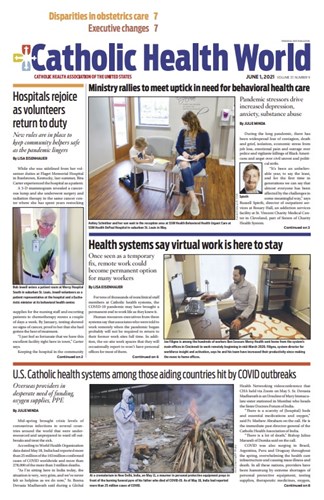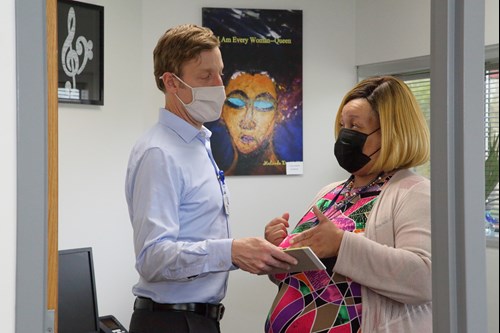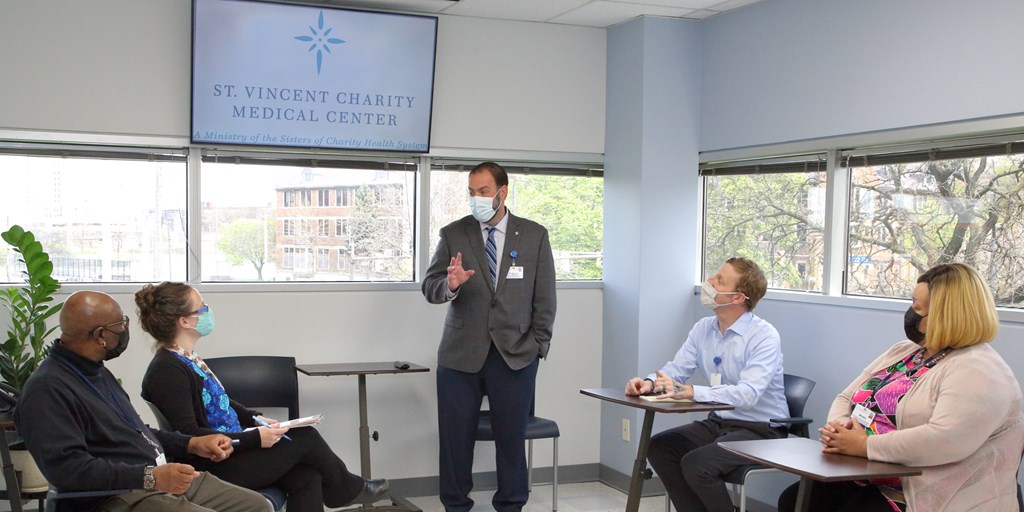St. Vincent Charity Medical Center offers a variety of inpatient and outpatient services to those in need of Behavioral Health and substance use disorder. Using an interdisciplinary approach, St. Vincent Charity Medical Center’s dedicated team delivers compassionate care that focuses on the needs of the whole patient — physical, emotional and social, as well as the needs of their families.
Rosary Hall has been at the forefront of treating drug dependency for nearly 70 years – treating more than 100,000 individuals with the compassionate care that is the hallmark of the hospital. To learn more about becoming a new patient, please complete this quick online form or call 216-363-2580.
Most Americans, directly or indirectly, experience behavioral health challenges at some point in their lives. For some, it’s a life-long struggle that drains resources and fractures families. In greater Cleveland, persons with mental illness and addiction have some of the direst needs, which have been further exacerbated by Covid-19.
 In its June 1 issue, Catholic Health World features St. Vincent Charity Medical Center in a cover story on pandemic stressors driving increased depression, anxiety and substance abuse. Individuals struggling with mental health and addiction challenges not only face a tremendous amount stigma, but they also receive their care from a too fragmented and disconnected delivery system. This is something St. Vincent Charity Medical Center is working to address through its Integrated Care approach – including expanded services and through community partnerships to achieve a complete continuum.
In its June 1 issue, Catholic Health World features St. Vincent Charity Medical Center in a cover story on pandemic stressors driving increased depression, anxiety and substance abuse. Individuals struggling with mental health and addiction challenges not only face a tremendous amount stigma, but they also receive their care from a too fragmented and disconnected delivery system. This is something St. Vincent Charity Medical Center is working to address through its Integrated Care approach – including expanded services and through community partnerships to achieve a complete continuum.
As featured in this national story, St. Vincent Charity Medical Center’s Behavioral Health leaders highlight the need to begin to normalize treatment; work together as a system to prepare for the ever increasing need; and move to more integrated, coordinated continuums so people do not get lost when they need treatment most.
The full text of the article is below or available here:
Ministry rallies to meet uptick in need for behavioral health care
Volume: 37; Number: 9; June 1, 2021
By Julie Minda, Catholic Health World
https://www.chausa.org/publications/catholic-health-world/archives/issues/june-1-2021/ministry-rallies-to-meet-uptick-in-need-for-behavioral-health-care
During the long pandemic, there has been widespread fear of contagion, death and grief, isolation, economic stress from job loss, emotional pain and outrage over police and vigilante killings of Black Americans and angst over civil unrest and political strife.
 "It's been an unbelievable year, to say the least, and for the first time in generations we can say that almost everyone has been affected by the challenges in some meaningful way," says Dr. Russell Spieth, director of outpatient services at Rosary Hall, an addiction services facility at St. Vincent Charity Medical Center in Cleveland, part of Sisters of Charity Health System.
"It's been an unbelievable year, to say the least, and for the first time in generations we can say that almost everyone has been affected by the challenges in some meaningful way," says Dr. Russell Spieth, director of outpatient services at Rosary Hall, an addiction services facility at St. Vincent Charity Medical Center in Cleveland, part of Sisters of Charity Health System.
He and others providing mental health and substance dependence treatment at ministry facilities say their organizations have been continuously adapting to the changing dynamics of the pandemic to respond to the escalating demand for behavioral health services. They began or significantly expanded telehealth services and reopened in-person behavioral health services when it was safe to do so. They expanded partnerships with community organizations to do outreach, so that low-income people knew where and how to access behavioral health services. But more work remains.
Spieth says, "The risk is that we have an even larger proportion of the population struggling with untreated mental health and substance abuse conditions that affect their well-being. Research shows that if we don't adequately address these, we'll have even worse outcomes down the line, including more people incarcerated, more homelessness, more violence, more suicide."
"If we don't address mental health concerns early on, they don't just go away, they just become bigger crises later," agrees Carla Gerber, clinical manager of behavioral health services for PeaceHealth's Oregon Network.
From bad to worse
For several years before the pandemic, the Trust for America's Health and Providence's Well Being Trust issued "Pain in the Nation" reports, documenting the escalating rates of deaths of despair, or deaths from alcohol, suicide, synthetic opioids, and psychostimulants.
Spieth says the Cleveland area went into the pandemic with high levels of opioid and crack use, high suicide rates and high rates of homelessness, and things have gotten worse since. Homelessness can be both the result and the cause of mental health distress.
Joan Tompkins, manager of behavioral health operations for the Oregon region of PeaceHealth, adds that even prior to the pandemic, providers had been seeing increasing rates of high-acuity mental health conditions necessitating higher levels of care, such as inpatient psychiatric care. She notes that escalation of mental health distress is taking place amid a nationwide shortage of mental health professionals.
When the pandemic shutdowns took effect, people with mental health challenges suddenly lost some of the supports they had relied on, which often exacerbated their symptoms, says Michelle Schafer, regional vice president of behavioral health for St. Louis-based SSM Health. Many mental health clinics temporarily shut down until they acquired personal protective gear for staff and put protocols in place to safely deliver care.
There was a slight lag before providers were equipped to offer counseling and psychiatric services over telehealth connections. And, says Schafer, when it came to in-person care, "in the beginning people were afraid to access services. They put mental health care and regular health care off because they did not want to go out and risk getting COVID."
Many support group meetings moved online, but Spieth says the temporary halt of in-person peer gatherings and one-on-ones with sobriety sponsors at first caught vulnerable people off-guard and dealt a heavy blow to the sobriety community.

Dr. Russell Spieth, director outpatient services at Rosary Hall, discusses a client with Melinda Davis, a peer recovery support specialist. Spieth says there's been an escalation of behavioral health needs amid the pandemic. Rosary Hall is part of St. Vincent Charity Medical Center in Cleveland.
Socioeconomic stressors
As infection controls locked down schools, churches, businesses and numerous other institutions, the financial and social repercussions on mental health care became widespread. With jobs eliminated or hours cut back, there was increased financial stress particularly among hourly workers.
PeaceHealth's Tompkins notes that late summer and early fall wildfires in and around Southern Oregon and in the Willamette Valley south of Portland compounded community members' pandemic-related stress and anxiety. Tens of thousands of people had to evacuate their homes. Thousands of residences burned.
All across the country, people experienced the pain of isolation and loss, with elders especially affected.
Dr. Arpan Waghray, chief medical officer of Providence St. Joseph Health Behavioral Medicine, says children separated from peers when schools went virtual struggled because of the lack of socialization. He says there has been a significant increase in antidepressants being prescribed to youth during the pandemic.
Domestic and partner violence grew during the pandemic as victims of all ages were forced to be sequestered with their abusers, unable to privately and safely reach out for the help of a teacher or agencies in the community.
Tompkins notes the nation's most vulnerable who are most at risk of mental health distress include unhoused people. Though shelters quickly came up with strategies to reduce their capacity while maintaining people's housing — such as by relocating some shelter residents to hotels — many shelters in communities with high rates of homelessness still struggled to meet the high level of need as they cut capacity to adhere to COVID prevention protocols. This worsened mental distress for many homeless people.

Megan Bush is director of intake and access for the behavioral health practice area of St. Vincent Charity Medical Center. She says that while virtually everyone was negatively impacted by the pandemic in some way, people of color were particularly exposed. Blacks were almost two times as likely as whites to die of COVID. And Black people were disproportionately affected by job loss in the pandemic. If job loss spurred mental distress, Black people were the least likely to trust the health system's mental health services. The insidious stress of structural racism added to their suffering, she says.
A sea of anxiety and depression

Dr. Michael Biscaro, St. Vincent Charity Medical Center chief of behavioral health, says pandemic-related stress exacerbated existing mental health issues for some. According to a Washington Post analysis of Census Bureau data, "about one-third of Americans are showing signs of clinical anxiety or depression" amid the pandemic.
Although ministry providers have seen an uptick in demand for mental health services, those interviewed for this article suspect many people in their service areas have not sought maintenance treatment for their serious, chronic mental health conditions because of pandemic-related barriers to care. As a result, Dr. Biscaro says, at St. Vincent Charity Medical Center, some patients are coming in with more acute symptoms of serious mental illness and are requiring more time in the hospital to stabilize their illnesses.
Dr. Biscaro gave the example of a middle-aged patient with bipolar disorder who came to St. Vincent in a manic state. In the past, she had been agreeable to taking medications and usually stabilized quickly. But, she had not been to her mental health provider in nearly a year, and it required "legal intervention and a lot of work to administer appropriate treatment," he says.
Reducing stigma
Despite the imposing challenges, these providers say the pandemic has helped more people to understand the importance of mental wellness and the need to tend to it.
PeaceHealth's Tompkins notes, "Throughout the pandemic there has been a real cultural shift when it comes to discussions about mental health. People have normalized talking about their mental health struggles, and this is really a good thing." She hopes this will help to reduce mental health stigma, so that more people will come to believe that it is not just acceptable but responsible to seek mental health care.
Dr. Spieth suspects all mental health providers will be seeing waves of new patients coming in for treatment for the foreseeable future. But Dr. Biscaro says since the average delay between onset of mental illness symptoms and treatment is five to 10 years, depending on the diagnosis, mental health providers could be seeing the residual effects of the pandemic among incoming patients for quite some time.
Schafer notes people who cultivate resiliency adapt and recover better in times of emotional hardship. "If you don't have resiliency, you can be lost in the stress, not see your way out, turn to drugs, alcohol or other unhealthy ways to cope." Resiliency can be developed by connecting with others, making healthy choices and being focused on solutions rather than victimhood, she says.
Waghray says throughout the pandemic he witnessed people stepping out of their comfort zones to help one another, to build one another up. He says he expects there will be "post-traumatic growth" in the American psyche.
"My hope is that we will not just bounce back, but that we will bounce forward" to a place of better mental health, he says.
St. Vincent Charity Medical Center offers a variety of inpatient and outpatient services to those in need of Behavioral Health and substance use disorder. Using an interdisciplinary approach, St. Vincent Charity Medical Center’s dedicated team delivers compassionate care that focuses on the needs of the whole patient — physical, emotional and social, as well as the needs of their families.
Rosary Hall has been at the forefront of treating drug dependency for nearly 70 years – treating more than 100,000 individuals with the compassionate care that is the hallmark of the hospital. To learn more about becoming a new patient, please complete this quick online form or call 216-363-2580.



